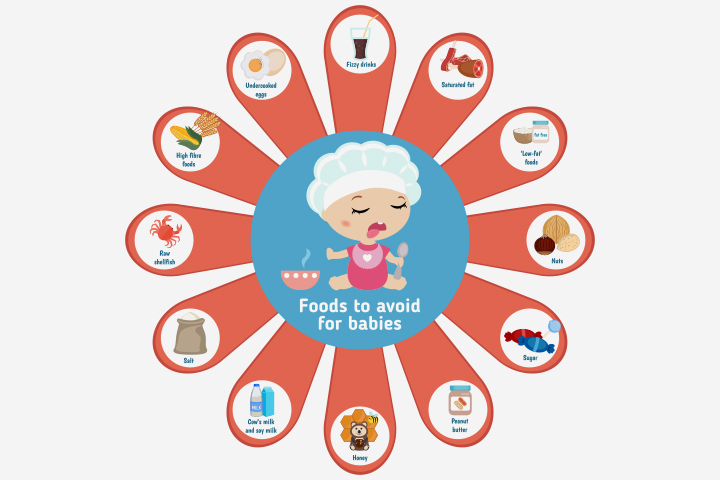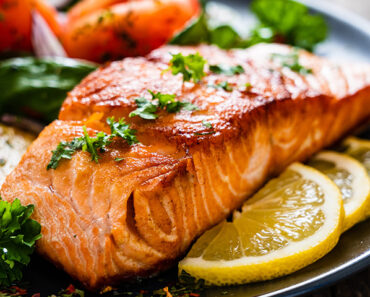Complementary feeding is an essential milestone in a baby’s life. This transition from breastfeeding to weaning indicates that the baby is growing well. A well-growing, healthy baby can eat several solid foods from different food groups. However, this doesn’t mean they can eat everything.
Babies under 12 months are still developing vital oral skills and have an immature digestive system. Therefore, while selecting age-appropriate weaning foods, parents need to stay mindful of the foods to avoid for babies younger than a year.
If you are first-time parents looking for a list of foods to avoid for babies, then read on. This post gives you an overview of foods you should avoid feeding your baby until they reach 12 months of age.
Foods To Avoid For Babies
1. Refined sugar
The Centersfor Disease Control and Prevention (CDC) advise against feeding added sugar to babies under24 months (1). According to experts, babies shouldn’t eat sugar alone or as a part of food because sugar adds additional calories to the diet and can cause tooth decay over time. Also, exposing babies to sugar in infancy and early childhood maycause a baby to develop a preference for sweet foods.
An individual with a sweet tooth is highly likely to consume sugar in excess later in life, leading to chronic health issues, such as type-2 diabetes. Therefore, you shouldn’t feed sugary drinks, such as fruit juices, and sugary snacks, such as sweet biscuits, to babies (2).
2. Honey
Honey is a natural sweetener and has trace minerals and antioxidants. It is why honey is considered a healthy alternative to sugar. However, babies under 12 months can’t consume honey due to infant botulism risk.
Besides, honey contains considerable amounts of sugar, which confers similar health risks as refined sugar upon overconsumption. Thus, parents shouldn’t feed honey to babies under 12 months (2)(3).
3. Salt
Babies between 7-12 months require 0.37grams of sodium per day (2). According to experts, most healthy, full-term infants can meet this requirement from breast milk or formula. Therefore, you shouldn’t add salt to your baby’s food (3). It is vital because if a baby consumes added salt, it exposes them to excess sodium, which exerts undue stress on their immature kidneys.
Parents should abstain from feeding readymade, highly processed, high-sodium foods, such as chips, crisps, fries, bacon, and sausages. Also, they shouldn’t use stock cubes and gravy to prepare weaning foods for babies since these also contain high quantities of sodium.
4. Cow’s milk
Whole cow milk can provide several nutrients, but it is not suitable for babies under 12 months (2). The recommendation is based on the fact that cow milk lacks essential nutrients, such as vitamin E, iron, and zinc, which a baby needs for healthy growth and development (4).
Besides, it has heavy proteins and minerals that put undue stress on a baby’s still-developing kidneys (5). These proteins can irritate the baby’s digestive system lining, causing occult bleeding, increasing the risk of iron deficiency anemia (IDA) over time.
5. Cheese
Registered dietitian and client success manager at Omada Health Julie Harris says, “Many types of cheese can be part of a balanced diet for babies, as it is a good source of calcium, protein, and vitamins. Yet, babies should not be fed mold-ripened soft cheeses, like brie, goat cheese, or blue cheese. These types of cheeses have a higher risk of carrying listeria (bacteria). Any cheeses made from unpasteurized milk also carry the extra risk of listeria, and babies (and young kids) should avoid them.”
Listeria is a harmful bacterium that can cause food poisoning. Therefore, check the nutrition label and ingredient list carefully while buying cheese for your baby.
“Also it’s important to watch for milk allergy when serving cheese made from dairy. Since cow’s milk allergy is one of the most common allergies in babies, watch for symptoms when serving cheese during the early months,” notes Harris.
6. Unpasteurized foods
Consuming unpasteurized raw milk, yogurt, cider vinegar, and juices can expose a baby to E. coli bacteria. E. coli can cause severe illnesses, such as septicemia and meningitis in babies. Therefore, experts advise parents to avoid feeding unpasteurized foods to babies (1).
7. Fruit juices
The American Academy of Pediatrics (AAP) recommends against feeding fruit juices to infants. According to them, fruit juices offer no nutritional value to babies younger than one year. Besides, fruit juice intake is associated with tooth decay. Toddlers between one and three years can have no more than four ounces of 100 percent fresh or reconstituted fruit juice per day (6).
8. Smoked and cured meat
According to registered dietician nutritionist and founder of the Sprint Kitchen, Morgyn Clair, “parents want to make sure they avoid any meats that aren’t fully cooked through to at least a 165-degree internal temperature. Smoked meats sometimes are not cooked to this high degree, which ensures harmful bacteria is killed.”
Besides, smoked or cured meats, such as bacon, bologna, and salami, contain high fat, sodium, and nitrates (2). Hence feeding these foods to babies isn’t recommended.
9. High-mercury fish
Fish is a nutrient-rich food with vital nutrients, such as iodine, zinc, and high-quality lean proteins. Additionally, it has essential omega-3 fatty acids — DHA (docosahexaenoic acid) and EPA (eicosapentaenoic acid) that aid in an infant’s brain development. Babies need these nutrients for proper brain development. Therefore, you can feed low-mercury, fatty fishes, such as tuna light and salmon, to your baby. However, you must avoid fishes, such as bigeye tuna, shark, tilefish, and king mackerel, since they are high in mercury (2).
Mercury is a heavy metal that could impair an infant’s neurological development, leading to growth and development issues, such as impaired speech and motor skills development. Therefore, it is vital to avoid high-mercury fish for babies (7).
10. Raw and partially cooked eggs
Eggs are a nutrient-rich source of high-quality protein. Babies can consume well-cooked eggs as a part of a well-balanced weaning diet from six months of age. However, you shouldn’t feed raw and partially cooked eggs since they may pose a risk of salmonella and other bacterial infections.
Bacterial infections can cause food poisoning in babies and adversely harm their immature digestive systems. Some foods containing raw or partially cooked eggs are homemade ice cream, mayonnaise, eggnog, and certain salad dressings (2)(8).
11. Raw sprouts
Sprouts, such as alfalfa and mung bean sprouts, are healthy foods that can offer protein, fiber, and several micronutrients. However, feeding raw sprouts to babies isn’t advisable (8)(9). It is because raw sprouts may contain harmful bacteria, such as salmonella and E.coli. These bacteria can cause food poisoning affecting the baby’s health severely. Thus, feed only well-cooked sprouts to babies.
12. Whole nuts and peanuts
Whole nuts, such as almonds, cashew, pistachio, and peanuts, are a potential choking hazard for babies under four years of age (2). So, you must avoid feeding them to babies. However, since these foods are healthy, you can finely chop or powder them before adding them to different weaning foods, such as muffins and porridges.
13. Raw vegetables and fruits
Apple, baby carrot, celery, corn, and green peas are fruits and veggies that are a potential choking hazard for babies (2). Therefore, babies shouldn’t consume them unless they are cooked thoroughly. Whole grapes and berries are fruits that babies can eat raw but only when quartered.
14. Sticky foods
Raw jelly cubes, chewy fruits, snacks, marshmallows, and a dollop of peanut butter are some sticky foods that babies should avoid. Since these foods stick to the mouth, swallowing them gets difficult for babies, raising the risk of choking (2). Therefore, experts recommend avoiding these foods for babies until they are four years old.
15. Rice drinks
Rice is a common grain used as a complementary food for babies. However, when it comes to rice drinks, such as rice milk, experts recommend children under five years of age shouldn’t have rice milk as a substitute for breast milk or infant formula (10). It is because rice drinks may have high amounts of inorganic arsenic, which can affect the cognitive development of babies over time (2).
In addition to these, babies should avoid highly processed foods, such as cakes, donuts, and fries, as they are high in saturated fat, sodium, and sugar which are harmful to their health. Also, you need to avoid foods that have triggered an allergic reaction in your baby.
Healthy, full-term babies above six months of age should consume foods from various food groups. However, there are some foods that a baby mustn’t consume for optimal health and well-being. Being a parent, you should know about these foods and the reason for their omission so that you could plan a healthy, age-appropriate diet for your baby.


































